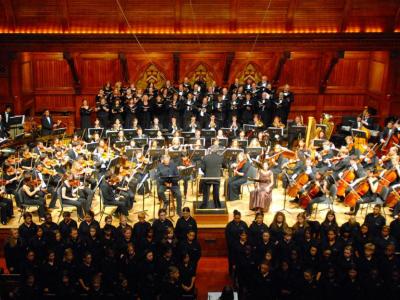What does a Concertmaster do?
Simultaneously the most skilled and knowledgeable violinist of the orchestra while also the chief intermediary between the musicians and the conductor, the concertmaster is responsible for dictating bowings to the first violin section; playing solo passages in the absence of a guest soloist; understanding the conductor's ideas and communicating them in technical terms to the rest of the orchestra; leading the orchestra in tuning before rehearsals and performances; and assisting with aspects of the orchestra's management. While conductors may come and go—with differing styles and approaches—the concertmaster provides the orchestra with consistent and technically oriented leadership.
In addition to being an excellent player with deep knowledge of orchestra repertoire and fantastic abilities as a soloist, concertmasters must also cultivate superb leadership, teaching, and communication skills.
In addition to her or his regular duties, a concertmaster might assist in the audition and hiring process for principal players, resolve problems—artistic, technical, or personal—between members of the orchestra, or even work closely with the orchestra's music director as their right-hand person, weighing in on all artistic decisions. The importance of the concertmaster's leadership is not to be underestimated. While performing, the string musicians generally watch the concertmaster nearly as closely as they do the conductor—more so in cases where the guest conductor isn't gelling well with the orchestra.
At a Glance
The concertmaster is the highest leadership position among all the musicians in the orchestra, second in authority only to the conductor and music director (who may be the same person). Some concertmasters are former soloists who chose to settle down and join an orchestra, although most are dedicated long-term orchestra musicians who have worked their way up the ranks.
Concertmasters are seasoned professionals who are likely to have been through the audition process many times over, toured throughout the world, performed nearly every solo in common orchestra repertoire, and led various violin sections before even earning the position. While concertmasters could go on to become conductors, music directors, or even artistic directors, they're more likely to advance by auditioning for similar positions with more prestigious orchestras.
The variety of concertmaster described above—a violinist who oversees the first string section—works as a full-time employee for a symphony orchestra, one per orchestra. Symphony concertmasters typically work their way up to the position after many years with the orchestra and prior leadership positions (e.g. principal second violin).
In a concert band setting, the concertmaster role may be filled by a principal wind instrument player, while in brass bands it may be performed by a highly skilled trumpeter.
- Violin performance
- Sight-reading
- Deep knowledge of orchestral repertoire
- High-level instrumental proficiency and technical knowledge
- Dictating bowings for the string section
- Soloing
- Leadership
- Verbal communication
The concertmaster plays a complex, varied, and pivotal role within an orchestra. In addition to being an excellent player with deep knowledge of orchestra repertoire and fantastic abilities as a soloist, concertmasters must also cultivate superb leadership, teaching, and communication skills, as the job involves giving direction, offering guidance, resolving problems, interpreting direction from the conductor for musicians, and vice versa.
On top of daytime rehearsals and evening performances, concertmasters spend time practicing, meeting with the orchestra's conductor, studying scores, preparing music for orchestra members, and more. Their work life resembles that of any other orchestra member, but with the additional responsibilites of resolving interpersonal problems, meeting with the conductor, and setting an example for the rest of the orchestra—meaning they're likely to arrive first for rehearsal and leave last.




